| |
Date |
Event(s) |
| 1 | 1766 | - 1766—1766: Start of 'composite' national records on rainfall in the UK
- 5 Dec 1766—5 Dec 1766: Christie's auction house founded in London by James Christie
|
| 2 | 1767 | - 1767—1767: Newcomen's steam pumping engine perfected by James Watt
|
| 3 | 1768 | - 9 Jan 1768—9 Jan 1768: Philip Astley starts his circus in London
- 6 Dec 1768—6 Dec 1768: The first edition of the Encyclopaedia Britannica' published in Edinburgh by
William Smellie
|
| 4 | 1769 | - 1769—1769: Arkwright invents water frame (textile production)
- 1769—1769: Capt James Cook maps the coast of New Zealand
- 6 Sep 1769—6 Sep 1769: David Garrick organises first Shakespeare festival at Stratford-upon-Avon
|
| 5 | 1770 | - 1770—1770: Clyde Trust created to convert the River Clyde, then an insignificant river, into a major
thoroughfare for maritime communications
- 28 Apr 1770—28 Apr 1770: Capt James Cook lands in Australia (Botany Bay) ? Aug 21: formally claims
Australia for Britain
|
| 6 | 1771 | - 1771—1771: Right to report Parliamentary debates established in England
|
| 7 | 1772 | - 1772—1772: First Travellers' Cheques issued by the London Credit Exchange Company
- 1772—1772: Morning Post' first published (until 1937)
- 14 May 1772—14 May 1772: Judge Mansfield rules that there is no legal basis for slavery in England
|
| 8 | 1774 | - 13 Sep 1774—13 Sep 1774: Cook arrives on Easter Island
|
| 9 | 1775 | - 19 Apr 1775—19 Apr 1775: Battle of Lexington: first action in American War of Independence (1775- 1783)
- 19 Apr 1775—3 Sep 1783:
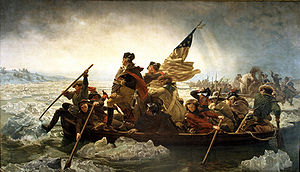 American Revolutionary War American Revolutionary War
|
| 10 | 1776 | - 1776—1776: Somerset House in London becomes the repository of records of population
- 1776—1776: Watt and Boulton produce their first commercial steam engine
- 4 Jul 1776—4 Jul 1776: American Declaration of Independence
- 7 Sep 1776—7 Sep 1776: First attack on a warship by a submarine - David Bushnell's ?Turtle' attacked
HMS Eagle in New York harbour. The attack was perhaps spectacular (a charge did
detonate beneath the ship) but was nevertheless unsuccessful. 'Turtle' was a one man
Affair man-powered [Les Moore]
|
| 11 | 1777 | - 1777—1777: Samuel Miller of Southampton patents the circular saw.
|
| 12 | 1779 | - 1779—1779: Marc Isambard Brunel opens the first steamdriven sawmill at Chatham Dockyard in Kent
- 1779—1779: First iron bridge built, over the Severn by John Wilkinson
- 1779—1779: First Spinning Mills operational in Scotland
- 14 Feb 1779—14 Feb 1779: Capt James Cook killed on Hawaii
- 23 Sep 1779—23 Sep 1779: Naval engagement between Britain and USA off Flamborough Head
|
| 13 | 1780 | - 1780—1780: Male Servants Tax
- 1780—1780: The English Reform Movement - until now, only landowners and tenants (freeholders
with 40 shillings per year or more) allowed to vote, and in open poll books
- 1780—1780: Fountain pen invented
- 1780—1780: About this time the word 'Quiz' entered the language, said to have been invented as a
wager by Mr Daly, a Dublin theatre manager
- 4 May 1780—4 May 1780: First Derby run at Epsom (some say 2nd June)
- 2 Jun 1780—2 Jun 1780: Jun 2- 8: The Gordon Riots - Parliament passes a Roman Catholic relief measure - for
days, London is at the mercy of a mob and destruction is widespread
|
| 14 | 1782 | - 1782—1782: Gilbert's Act establishes outdoor poor relief - the way of life of the poor beginning to
alter due to industrialisation - New factories in rapidly expanding towns required a workforce
that would adjust to new work patterns
- 1782—1782: James Watt patents his steam engine
|
| 15 | 1783 | - 1783—1783: Duty payable on Parish Register entries (3d per entry - repealed 1794) - led to a fall in
entries!
- 3 Sep 1783—3 Sep 1783: Treaty of Versailles (Britain/US)
- 3 Nov 1783—3 Nov 1783: Last public execution at Tyburn in London (John Austin, a highwayman)
|
| 16 | 1784 | - 1784—1784: Pitt's India Act - the Crown (as opposed to officers of the East India Company) has
power to guide Indian politics
- 1784—1784: Wesley breaks with the Church of England
- 1784—1784: First golf club founded at St Andrews
- 1784—1784: Invention of threshing machine by Andrew Meikle
- 2 Aug 1784—2 Aug 1784: First mail coaches in England (4pm Bristol / 8am London)
|
| 17 | 1785 | - 1785—1785: Sunday School Society founded to educate poor children (by 1851, enrols more than 2
million)
- 1785—1795:
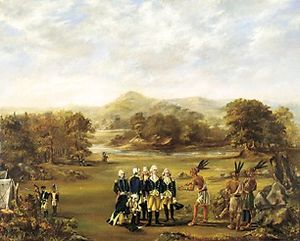 Northwest Indian War Northwest Indian War
- 1 Jan 1785—1 Jan 1785: John Walter publishes first edition of The Times (called The Daily Universal
Register for 3 years)
|
| 18 | 1787 | - 1787—1787: MCC (Marylebone Cricket Club) established at Thomas Lord's ground in London
|
| 19 | 1788 | - 1788—1788: First steamboat demonstrated in Scotland
- 1788—1788: Law passed requiring that chimney sweepers be a minimum of 8 years old (not
enforced)
- 1788—1788: First slave carrying act, the Dolben Act of 1788, regulates the slave trade - stipulates
more humane conditions on slave ships
- 1788—1788: King George III's mental illness occasions the Regency Crisis - Edmund Burke and
Charles James Fox attack ministry of William Pitt - trying to obtain full regal powers for the
Prince of Wales
- 1788—1788: Gibbon completes Decline and Fall of the Roman Empire'
- 26 Jan 1788—26 Jan 1788: First convicts (and free settlers) arrive in New South Wales (left Portsmouth 13
May 1787) ? the 'First Fleet'; eleven ships commanded by Captain Arthur Phillip
|
| 20 | 1789 | - 28 Apr 1789—28 Apr 1789: Mutiny on HMS Bounty - Captain William Bligh and 18 sailors are set adrift
and the rebel crew ends up on Pitcairn Island
- 30 Apr 1789—4 Mar 1797:
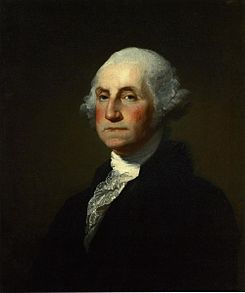 George Washington U.S. Presidency George Washington U.S. Presidency
|
| 21 | 1790 | - 1790—1790: Forth and Clyde Canal opened in Scotland
|
| 22 | 1791 | - 1791—1791: John Bell, printer, abandons the long s' (the 's' that looks like an 'f')
- 1791—1791: Establishment of the Ordnance Survey of Great Britain
- 4 Dec 1791—4 Dec 1791: First publication of The Observer - world's oldest Sunday newspaper
|
| 23 | 1792 | - 1792—1792: Repression in Britain (restrictions on freedom of the press) - Fox gets Libel Act through
Parliament, requiring a jury and not a judge to determine libel
- 1792—1792: Boyle's Street Directory published
- 1792—1792: Coal-gas lighting invented by William Murdock, an Ayrshire Scot
- 1 Oct 1792—1 Oct 1792: Introduction of Money Orders in Britain
- 1 Dec 1792—1 Dec 1792: King's Proclamation drawing out the British militia
|
| 24 | 1793 | - 11 Feb 1793—11 Feb 1793: Britain declares war on France (1793-1802)
- 15 Apr 1793—15 Apr 1793: ?5 notes first issued by the Bank of England
|
| 25 | 1794 | - 1794—1794: Abolition of Parish Register duties
- 6 Oct 1794—6 Oct 1794: The prosecutor for Britain, Lord Justice Eyre, charges reformers with High
Treason - he argued that, since reform of parliament would lead to revolution and revolution
to executing the King, the desire for reform endangered the King's life and was therefore
treasonous
|
| 26 | 1795 | - 1795—1795: The Famine Year
- 1795—1795: Foundation of the Orange Order
- 1795—1795: Speenhamland Act proclaims that the Parish is responsible for bringing up the labourer's
wage to subsistence level - towards the end of the eighteenth century, the number of poor and
unemployed increased dramatically - price increases during the Napoleonic Wars
(1793-1815) far outstripped wage rises - many small farmers were bankrupted by the move
towards enclosures and became landless labourers - their wages were often pitifully low
- 1795—1795: Pitt and Grenville introduce The Gagging Acts' or 'Two Bills' (the Seditious Meetings and Treasonable Practices Bills) - outlawed the mass meeting and the political lecture.
- 1795—1795: Consumption of lime juice made compulsory in Royal Navy
|
| 27 | 1796 | - 1796—1796: Pitt's Reign of Terror': More treason trials - leading radicals emigrate
- 1796—1796: Legacy Tax on sums over ?20 excluding those to wives, children, parents and
grandparents
- 14 May 1796—14 May 1796: Dr Edward Jenner gave first vaccination for smallpox in England
|
| 28 | 1797 | - 1797—1797: England in Crisis, Bank of England suspends cash payments
- 1797—1797: Mutinies in the British Navy at Spithead and Nore
- 1797—1797: Tax on newspapers (including cheap, topical journals) increased to repress radical
publications
- 1797—1797: The first copper pennies were produced ('cartwheels') by application of steam power to
the coining press
- 22 Feb 1797—22 Feb 1797: French invade Fishguard, Wales; last time UK invaded; all captured 2 days later
- 26 Feb 1797—26 Feb 1797: First ?1 (and ?2) notes issued by Bank of England
- 4 Mar 1797—4 Mar 1801:
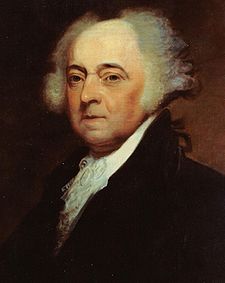 John Adams U.S. Presidency John Adams U.S. Presidency
|
| 29 | 1798 | - 1798—1798: First planned human experiment with vaccination, to test theories of Edward Jenner
- Feb 1798—Feb 1798: The Irish Rebellion; 100,000 peasants revolt; approximately 25,000 die - Irish
Parliament abolished (Feb-Oct)
- 7 Jul 1798—30 Sep 1800:
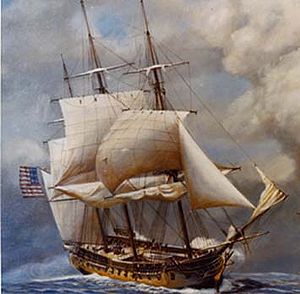 Franco-American War Franco-American War
- 1 Aug 1798—1 Aug 1798: Battle of the Nile (won by Nelson)
|
| 30 | 1799 | - 1799—1799: Foundation of Royal Military College Sandhurst by the Duke of York
- 1799—1799: Foundation of the Royal Institution of Great Britain
- 9 Jan 1799—9 Jan 1799: Pitt brings in 10% income tax, as a wartime financial measure
- 12 Jul 1799—12 Jul 1799: 'Combination Laws' in Britain against political associations and combinations
- 15 Jul 1799—15 Jul 1799: ?Rosetta Stone' discovered in Egypt made possible the deciphering (in 1822) of Ancient Egyptian hieroglyphics
|
| 31 | 1800 | - 1800—1800: Electric light first produced by Sir Humphrey Davy
- 1800—1800: Use of high pressure steam pioneered by Richard Trevithick (1771-1833)
- 1800—1800: Royal College of Surgeons founded
- 1800—1800: Herschel discovers infra-red light
- 1800—1800: Volta makes first electrical battery
- 2 Jul 1800—2 Jul 1800: Parliamentary union of Great Britain and Ireland
|
| 32 | 1801 | - 1801—1801: Grand Union Canal opens in England
- 1801—1801: Elgin Marbles brought from Athens to London
- 1 Jan 1801—1 Jan 1801: Union Jack becomes the official British flag
- 4 Mar 1801—4 Mar 1809:
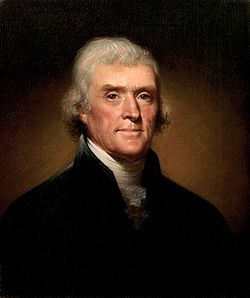 Thomas Jefferson U.S. Presidency Thomas Jefferson U.S. Presidency
- 10 Mar 1801—10 Mar 1801: First census puts the population of England and Wales at 9,168,000. Population of Britain nearly 11 million (75% rural)
- 10 May 1801—10 Jun 1805:
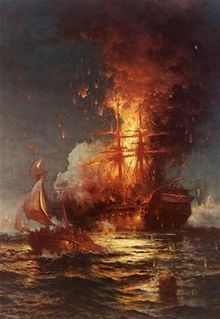 First Barbary War First Barbary War
- 24 Dec 1801—24 Dec 1801: Richard Trevithick built the first self-propelled passenger carrying road loco
|
| 33 | 1802 | - 25 Mar 1802—25 Mar 1802: Treaty of Amiens signed by Britain, France, Spain, and the Netherlands ? the 'Peace of Amiens' as it was known brought a temporary peace of 14 months during the Napoleonic Wars ? one of its most important cultural effects was that travel and correspondence across the English Channel became possible again
|
| 34 | 1803 | - 1803—1803: Poaching made a Capital offense in England if capture resisted
- 1803—1803: Richard Trevithick built another steam carriage and ran it in London as the first
self-propelled vehicle in the capital and the first London bus
- 1803—1803: Semaphore signaling perfected by Admiral Popham
- 30 Apr 1803—30 Apr 1803: Louisiana Purchase: Napoleon sells French possessions in America to United States
- 12 May 1803—12 May 1803: Peace of Amiens ends ? resumption of war with France ? The Napoleonic Wars (1803-18l5)
- 23 Jul 1803—23 Jul 1803: First public railway opens (Surrey Iron Railway, 9 miles from Wandsworth to
Croydon, horse-drawn)
|
| 35 | 1804 | - 1804—1804: Matthew Flinders recommends that the newly discovered country, New Holland, be renamed 'Australia'
- 21 Feb 1804—21 Feb 1804: Richard Trevithick runs his railway engine on the Penydarren Railway (9.5 miles
from Pen-y-Darren to Abercynon in South Wales) this hauled a train with 10 tons of
iron and 70 passengers. It was commemorated by the Royal Mint in 2004 in the form of
A ?2 coin.
- 3 Mar 1804—3 Mar 1804: John Wedgwood (eldest son of the potter Josiah Wedgwood) founds The Royal
Horticultural Society
- 2 Dec 1804—2 Dec 1804: Napoleon declares himself Emperor of the French
- 12 Dec 1804—12 Dec 1804: Spain declares war on Britain
|
| 36 | 1805 | - 1805—1805: London docks opened
- 21 Oct 1805—21 Oct 1805: Admiral Nelson's victory at Trafalgar
- 2 Dec 1805—2 Dec 1805: Battle of Austerlitz; Napoleon defeats Austrians and Russians
|
| 37 | 1806 | - 1806—1806: Dartmoor Prison opened (built by French prisoners)
- 9 Jan 1806—9 Jan 1806: Nelson buried in St Paul's cathedral, London
|
| 38 | 1807 | - 1807:
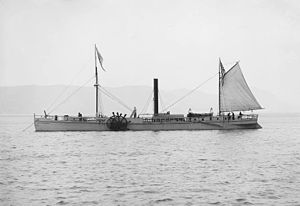 Fulton's First Steamboat Voyage Fulton's First Steamboat Voyage
- 25 Mar 1807—25 Mar 1807: Parliament passes Act prohibiting slavery and the importation of slaves from 1808 ? but does not prohibit colonial slavery
|
| 39 | 1808 | - 1808—1808: Gas lighting in London streets
- 13 Jul 1808—13 Jul 1808: 'Hot Wednesday' ? temperature of 101?F in the shade recorded in London
- 20 Dec 1808—20 Dec 1808: Beethoven premieres his Fifth Symphony, Sixth Symphony, Fourth Piano Concerto and Choral Fantasy together in Vienna
|
| 40 | 1809 | - 12 Feb 1809—12 Feb 1809: Birth of Charles Darwin
- 4 Mar 1809—4 Mar 1817:
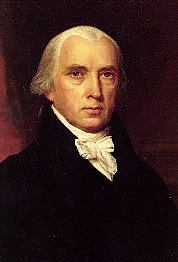 James Madison U.S. Presidency James Madison U.S. Presidency
- 18 Sep 1809—18 Sep 1809: Royal Opera House opens in London
|
| 41 | 1810 | - 1810—1810: John McAdam begins road construction in England, giving his name to the process of
road metalling
|
| 42 | 1811 | - 5 Feb 1811—5 Feb 1811: Prince of Wales (future George IV) made Regent after George III deemed insane
|
| 43 | 1812 | - 11 May 1812—11 May 1812: Prime Minister, Spencer Perceval, assassinated ? shot as he entered the House of Commons by a bankrupt Liverpool broker, John Bellingham, who was subsequently hanged
- 18 Jun 1812—18 Jun 1812: Start of American 'War of 1812' (to 1814) against England and Canada
- 18 Jun 1812—17 Feb 1815:
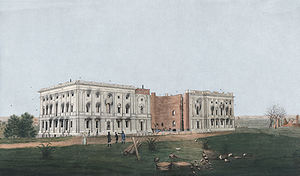 War of 1812 War of 1812
- Oct 1812—Oct 1812: Napoleon retreats from Moscow with catastrophic losses
|
| 44 | 1813 | - 1813—1813: Ireland: First recorded '12th of July' sectarian riots in Belfast
- 1813—1813: Jane Austen wrote 'Pride and Prejudice'
|
| 45 | 1814 | - 1 Jan 1814—1 Jan 1814: Invasion of France by Allies
- 6 Apr 1814—6 Apr 1814: Napoleon abdicates and is exiled to Elba
- 13 Aug 1814—13 Aug 1814: Convention of London signed, a treaty between the UK and the Dutch
- 24 Aug 1814—24 Aug 1814: The British burn the White House
- 29 Nov 1814—29 Nov 1814: 'The Times' first printed by a 'mechanical apparatus' (at 1100 sheets per hour)
- 24 Dec 1814—24 Dec 1814: Treaty of Ghent signed ending the 1812 war between Britain and the US
|
| 46 | 1815 | - 1815—1815: Trial by Jury established in Scotland
- 1815—1815: Davy develops the safety lamp for miners
- 3 Mar 1815—5 Dec 1815:
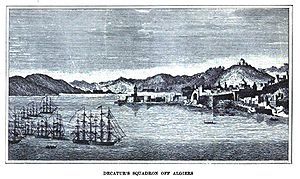 Second Barbary War Second Barbary War
- 18 Jun 1815—18 Jun 1815: The Battle of Waterloo: Napoleon defeated and exiled to St. Helena
- 18 Jun 1815:
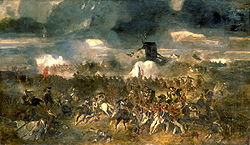 The Battle of Waterloo The Battle of Waterloo
|
| 47 | 1816 | - 1816—1816: Income tax abolished
- 1816—1816: For the first time British silver coins were produced with an intrinsic value substantially
below their face value ? the first official 'token' coinage
- 1816—1816: Climate: the 'year without a summer' ? followed a volcanic explosion of the mountain 'Tambora in Indonesia the previous year the biggest volcanic explosion in 10000 years
- 1816—1816: Large scale emigration to North America
- 1816—1816: Trans-Atlantic packet service begins
|
| 48 | 1817 | - 1817—1817: March of the Manchester Blanketeers; Habeas Corpus suspended
- 1817—1817: Constable painted 'Flatford Mill'
- 4 Mar 1817—4 Mar 1825:
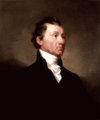 James Monroe U.S. Presidency James Monroe U.S. Presidency
|
| 49 | 1818 | - 1818—1818: Manchester cotton spinners' strike
- 20 Oct 1818—20 Oct 1818: 'Convention of 1818' signed between the United States and the United Kingdom
which, among other things, settled the US-Canada border on the 49th parallel for most of its
length
|
| 50 | 1819 | - 1819—1819: Primitive bicycle, the Dandy Horse, becomes popular
- 1819—1819: Britain returns to gold standard
- 1819—1819: Singapore founded by Sir Stamford Raffles
- May 1819—May 1819: SS 'Savannah' first steamship to cross Atlantic reaching Liverpool 20 June 1819 (26
Days reaching Liverpool 20 June 1819 (26
Days mostly under sail)
- 16 Aug 1819—16 Aug 1819: Peterloo Massacre at Manchester ? a large, orderly group of 60,000 meets at St.
Peter's Fields, Manchester ? demand Parliamentary Reform ? mounted troops charge on the
meeting, killing 11 people and and maiming many others
|
| 51 | 1820 | - 1820—1820: Cato Street Conspiracy ? plot to assissinate British cabinet
- 1820—1820: Abolition of the Spanish Inquisition
- 29 Jan 1820—29 Jan 1820: Accession of George IV, previously Prince Regent
- 1 Aug 1820—1 Aug 1820: Regent's Canal in London opens
- 17 Aug 1820—17 Aug 1820: Trial of Queen Caroline to prove her infidelities so George IV can divorce her ?
George tries to secure a Bill of Pains and Penalties against her ? Caroline is virtually acquitted
because bill passed by such a small majority of Lords
|
| 52 | 1821 | - 1821—1821: Faraday publishes 'Principles of electro-magnetic rotation'
- 1821—1821: Constable paints 'The Hay Wain'
- 5 May 1821—5 May 1821: Napoleon Bonaparte dies on St Helena
|
| 53 | 1822 | - 14 Jun 1822—14 Jun 1822: Charles Babbage proposes a difference engine in a paper to the Royal Astronomical Society
|
| 54 | 1823 | - 1823—1823: New laws concerning marriage by license ? 'very troublesome' according to some the Act was repealed all in a hurry at the beginning of the next session
- 1823—1823: Peel begins penal reforms ? death penalty abolished for over 100 crimes
- 1823—1823: Rugby Football 'invented' at Rugby School
- 1823—1823: Rubberised waterproof material produced by MacIntosh
- 2 Dec 1823—2 Dec 1823: US President James Monroe delivers a speech establishing American neutrality in
future European conflicts (the 'Monroe Doctrine')
|
| 55 | 1824 | - 1824—1824: RSPCA established
- 1824—1824: Portland cement patented
- 4 Mar 1824—4 Mar 1824: Royal National Lifeboat Institution (RNLI) founded (called the 'National Institution for the Preservation of Life from Shipwreck' until 1854)
- 10 May 1824—10 May 1824: National Gallery in London opens to the public
|
| 56 | 1825 | - 4 Mar 1825—4 Mar 1829:
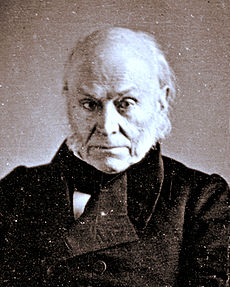 John Quincy Adams U.S. Presidency John Quincy Adams U.S. Presidency
- 27 Sep 1825—27 Sep 1825: Stockton to Darlington Railway opens ? world's first service of locomotive-hauled passenger trains
|
| 57 | 1827 | - 1827—1827: Ohm's Law published
|
| 58 | 1828 | - 25 Oct 1828—25 Oct 1828: St Katharine Docks in London opened (designed by Thomas Telford)
|
| 59 | 1829 | - 1829—1829: London Metropolitan Police Force formed, nicknamed 'Bobbies' after Sir Robert Peel
- 1829—1829: Louis Braille invents his system of finger-reading for the blind
- 4 Mar 1829—4 Mar 1837:
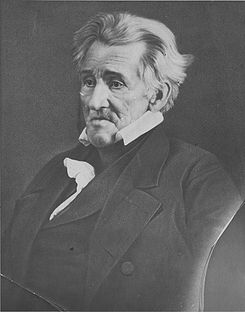 Andrew Jackson U.S. Presidency Andrew Jackson U.S. Presidency
- 10 Jun 1829—10 Jun 1829: First Oxford/Cambridge Boat Race
- 6 Oct 1829—6 Oct 1829: George Stephenson's Rocket wins the Rainhill trials (it was the only one to
complete the trial!)
|
| 60 | 1830 | - 1830—1830: Uprisings and agitation across Europe: the Netherlands are split into Holland and
Belgium
- 1830:
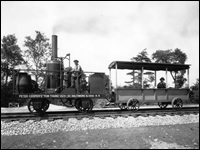 America's First Steam Locomotive America's First Steam Locomotive
- Jul 1830—Jul 1830: Revolution in France, fall of Charles X and the Bourbons ? Louis Philippe (the
Citizen King) on the throne
- 15 Sep 1830—15 Sep 1830: George Stephenson's Liverpool & Manchester Railway opened by the Duke of
Wellington ? first mail carried by rail, and first death on the railway as William Huskisson, a
leading politician, is run over!
|
| 61 | 1831 | - 1831—1831: A list of all parish registers dating prior to 1813 compiled
- 1 Jun 1831—1 Jun 1831: James Clark Ross discovers the North Magnetic Pole
- 1 Aug 1831—1 Aug 1831: 'New' London Bridge opens (replaced 1973) ? old bridge (which had existed for over 600 years) then demolished
|
| 62 | 1832 | - 1832—1832: Electoral Registers introduced
- 1832—1832: Electric telegraph invented by Morse
- 6 Apr 1832—27 Aug 1832:
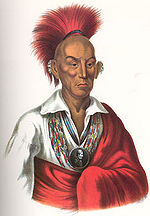 Black Hawk War Black Hawk War
- 7 Jun 1832—7 Jun 1832: Reform Bill passed ? Representation of the People Act
|
| 63 | 1833 | - Jan 1833—Jan 1833: Britain invades the Falkland Islands
- 29 Aug 1833—29 Aug 1833: Factory Act forbids employment of children below age of 9
|
| 64 | 1834 | - 1834—1834: Babbage invents forerunner of the computer
- 18 Mar 1834—18 Mar 1834: 'Tolpuddle Martyrs' transported (to Australia) for Trades Union activities
- 1 May 1834—1 May 1834: Slavery abolished in British possessions
|
| 65 | 1835 | - 1835—1835: Christmas becomes a national holiday
- 1835—1835: First railway boom period starts in Britain construction of Great Western Railway
- 2 Oct 1835—21 Apr 1836:
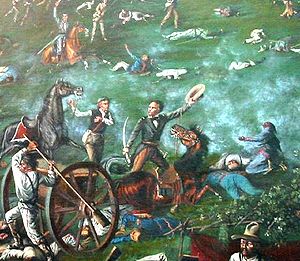 Texas War of Independence Texas War of Independence
|
| 66 | 1836 | - 1836—1836: First Potato famine in Ireland
- 30 Jan 1836—30 Jan 1836: Telford's Menai Straits Bridge opened ? considered the world's first modern suspension bridge
- 25 Feb 1836—25 Feb 1836: Samuel Colt patented the 'revolver'
- 6 Mar 1836—6 Mar 1836: The Alamo falls to Mexican troops - death of Davy Crockett
- Jul 1836—Jul 1836: Inauguration of the Arc de Triomphe in Paris
|
| 67 | 1837 | - 1837—1837: Pitman introduces his shorthand system
- 1837—1837: P&O Founded
- 1837:
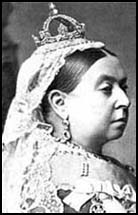 Victoria Becomes Queen Victoria Becomes Queen
- 4 Mar 1837—4 Mar 1841:
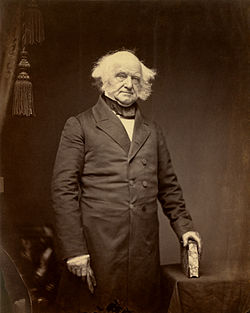 Martin Van Buren U.S. Presidency Martin Van Buren U.S. Presidency
- 20 Jun 1837—20 Jun 1837: William IV dies - accession of Queen Victoria (to 1901)
- 1 Jul 1837—1 Jul 1837: Compulsory registration of Births, Marriages & Deaths in England & Wales -
Registration Districts were formed covering several parishes; initially they had the same
boundaries as the Poor Law boundaries set up in 1834
- 13 Jul 1837—13 Jul 1837: Queen Victoria moves into the first Buckingham Palace
- 20 Jul 1837—20 Jul 1837: Euston Railway station opens - first in London
|
| 68 | 1838 | - 28 Jun 1838—28 Jun 1838: Coronation of Queen Victoria at Westminster Abbey
|
| 69 | 1839 | - 1839—1839: First Opium War between Britain and China (to 1842) - Britain captures Hong Kong
- 1839—1839: Scottish blacksmith Kirkpatrick MacMillan refines the primitive bicycle adding a
mechanical crank drive to the rear wheel,thus creating the first true 'bicycle' in the modern
Sense
- 1839—1839: Charles Goodyear invented vulcanized rubber
|
| 70 | 1840 | - 1840—1840: Population Act relating to taking of censuses in Britain
- 1840—1840: Last convicts landed in NSW (some say 1842 or 1849, but these probably landed
elsewhere)
- 10 Jan 1840—10 Jan 1840: Uniform Penny Postage introduced nationally
|
| 71 | 1841 | - 1841—1841: Thomas Cook starts package tours
- 10 Feb 1841—10 Feb 1841: Penny Red replaces Penny Black postage stamp
- 4 Mar 1841—4 Apr 1841:
 William Henry Harrison U.S. Presidency William Henry Harrison U.S. Presidency
- 4 Apr 1841—4 Mar 1845:
 John Tyler U.S. Presidency John Tyler U.S. Presidency
- 6 Jun 1841—6 Jun 1841: June 6: First full census in Britain in which all names were recorded (Population 18.5M)
|
| 72 | 1842 | - 1842—1842: Income Tax reintroduced in Britain
- 30 Mar 1842—30 Mar 1842: Ether used as an anesthetic for the first time (by Dr Crawford Long in America)
- 29 Aug 1842—29 Aug 1842: Treaty of Nanking - End of First Opium War - Britain gains Hong Kong
|
| 73 | 1843 | - 1843—1843: First Christmas card in England
- 27 May 1843—27 May 1843: The Great Hall of Euston station opened in London
- 19 Jul 1843—19 Jul 1843: Brunel's 'Great Britain' launched
|
| 74 | 1844 | - 6 Jun 1844—6 Jun 1844: YMCA founded in London by Sir George Williams
|
| 75 | 1845 | - 1845—1845: Tarmac laid for first time (in Nottingham)
- 4 Mar 1845—4 Mar 1849:
 James K. Polk U.S. Presidency James K. Polk U.S. Presidency
- 17 Mar 1845—17 Mar 1845: The rubber band patented by Stephen Perry
|
| 76 | 1846 | - 25 Apr 1846—2 Feb 1848:
 Mexican-American War Mexican-American War
- 10 Sep 1846—10 Sep 1846: The sewing machine is patented by Elias Howe
|
| 77 | 1847 | - 1847—1847: US Mormons make Salt Lake City their centre
- Jan 1847—Jan 1847: An anesthetic used for the first time in England (James Simpson used ether to numb the pain of labour)
|
| 78 | 1848 | - 1848—1848: First commercial production of chewing gum
- 24 Jan 1848—24 Jan 1848: Gold found at Sutter's Mill, California - starts the California gold rush
- 11 Jul 1848—11 Jul 1848: Waterloo railway station in London opens
|
| 79 | 1849 | - 1849—1849: Florin (2 shilling coin) introduced as the first step to decimalisation - which finally
occurred in 1971!
- 4 Mar 1849—9 Jul 1850:
 Zachary Taylor U.S. Presidency Zachary Taylor U.S. Presidency
|
| 80 | 1850 | |
| 81 | 1851 | - 1851—1851: Gold discovered in Australia
- 1 May 1851—1 May 1851: Great exhibition of the works of industry of all nations ('Crystal Palace' exhibition) opened in Hyde Park
|
| 82 | 1852 | - 1852—1852: Tasmania ceases to be a convict settlement
- 1852—1852: Wells Fargo established in USA
|
| 83 | 1853 | |
| 84 | 1854 | - 1854—1854: Cigarettes introduced into Britain
- 27 Mar 1854—27 Mar 1854: Britain declares war on Russia (Crimean War)
- 25 Oct 1854—25 Oct 1854: Battle of Balaklava in Crimea (charge of the Light Brigade)
|
| 85 | 1856 | - 1856—1856: End of Crimean War
- 29 Jan 1856—29 Jan 1856: Victoria Cross created by Royal Warrant, backdated to 1854 to recognise acts
during the Crimean War (first award ceremony 26 June 1857)
|
| 86 | 1857 | |
| 87 | 1858 | - 1858—1858: 'The great stink' - smell of the River Thames forced Parliament to stop work
- 1858—1858: Royal Opera House opens in Covent Garden, London
|
| 88 | 1859 | - 1859—1859: Peaceful picketing legalised in Britain
- 25 Apr 1859—25 Apr 1859: Work started on building the Suez canal (opened 17 Nov 1869)
- 4 May 1859—4 May 1859: Brunel's Royal Albert Bridge opened at Saltash giving rail link between Devon
and Cornwall
- 24 Nov 1859—24 Nov 1859: Charles Darwin publishes 'The Origin of Species'
|
| 89 | 1860 | - 29 Aug 1860—29 Aug 1860: First tram service in Europe starts in Birkenhead
|
| 90 | 1861 | |
| 91 | 1862 | - 1862—1862: Lincoln issues first legal US paper money (Greenbacks)
- 20 Apr 1862—20 Apr 1862: First pasteurisation test completed by Louis Pasteur and Claude Bernard
|
| 92 | 1863 | - 1863—1863: Football Association founded (UK)
- 1863—1863: Opening of state institution for criminally insane at Broadmoor, England
- 10 Jan 1863—10 Jan 1863: First section of the London Underground Railway opens
|
| 93 | 1864 | - 1864—1864: A man-powered submarine, 'Hunley' sank a Federal steam ship USS Housatonic at the entrance to Charleston harbour in 1864 - the first recorded successful attack by a submarine on a surface ship
- 11 Mar 1864—11 Mar 1864: The Great Sheffield Flood - over 250 died when a new dam broke while it was being filled for the first time
- 20 Aug 1864—20 Aug 1864: Red Cross established - Twelve nations sign the First Geneva Convention
- 8 Dec 1864—8 Dec 1864: Clifton Suspension Bridge over the River Avon officially opened
|
| 94 | 1865 | - 1865—1865: Elizabeth Garrett Anderson (1836-1917) becomes first woman doctor in England [she later became the first woman mayor in England, in Aldeburgh 1908]
- 1865—1865: First concrete roads built in Britain
- 14 Apr 1865—14 Apr 1865: End of American Civil War - slavery abolished in USA
- 14 Apr 1865—14 Apr 1865: Abraham Lincoln assassinated in Ford's Theatre by John Wilkes Booth
- 15 Apr 1865—4 Mar 1869:
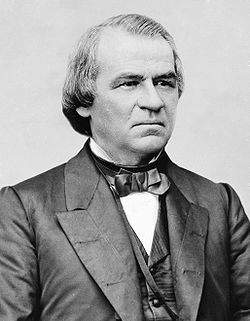 Andrew Johnson U.S. Presidency Andrew Johnson U.S. Presidency
- 5 Jul 1865—5 Jul 1865: William Booth (1829-1912) founds Salvation Army, in London
|
| 95 | 1867 | - 1 Jul 1867—1 Jul 1867: The British North America Act takes effect, creating the Canadian Confederation
|
| 96 | 1868 | - 1868—1868: Last convicts landed in Australia (Western Australia)
|
| 97 | 1869 | - 1869—1869: Ball bearings, celluloid, margarine, and washing machines, all invented
- 4 Mar 1869—4 Mar 1877:
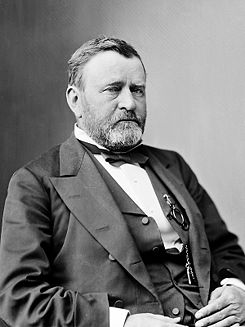 Ulysses S. Grant U.S. Presidency Ulysses S. Grant U.S. Presidency
- 23 Nov 1869—23 Nov 1869: Cutty Sark launched in Dumbarton
|
| 98 | 1870 | - 1870—1870: GPO takes over the privately-owned Telegraph Companies (nationalised)
- 1870—1870: Dr Thomas Barnardo opens his first home for destitute children
- 1870—1870: Water closets come into wide use
- 1870—1870: Diamonds discovered in Kimberley, South Africa
- 1 Oct 1870—1 Oct 1870: First British postcard - halfpenny post
|
| 99 | 1871 | - 27 Mar 1871—27 Mar 1871: First Rugby Football international, England v Scotland, played in Edinburgh
- 29 Mar 1871—29 Mar 1871: Opening of Royal Albert Hall, London
- 29 Jun 1871—29 Jun 1871: Trades Unions legalised in Britain, but picketing made illegal
|
| 100 | 1872 | - 1872—1872: Licensing hours introduced
- 1872—1872: Penalties introduced for failing to register births, marriages & deaths (Eng & Wales)
- 4 Dec 1872—4 Dec 1872: American ship 'Mary Celeste' is found abandoned by the British brig 'Dei Gratia' in the Atlantic Ocean
|
| 101 | 1874 | - 1874—1874: Factory Act introduces 56-hour week
- 5 Apr 1874—5 Apr 1874: Birkenhead Park opened, said to be the first civic public park in the world - features of it later copied in Central Park, New York
|
| 102 | 1875 | - 1875—1875: London's main sewage system completed
- 1 Jan 1875—1 Jan 1875: Midland Railway abolishes Second Class passenger facilities, leaving First Class and Third Class. Other British railway companies followed during the rest of the year. (Third Class was renamed Second Class in 1956)
|
| 103 | 1876 | - 14 Feb 1876—14 Feb 1876: Alexander Graham Bell and Elisha Gray each file a patent for the telephone - Bell awarded the rights
|



 Submit Photo / Document
Submit Photo / Document
